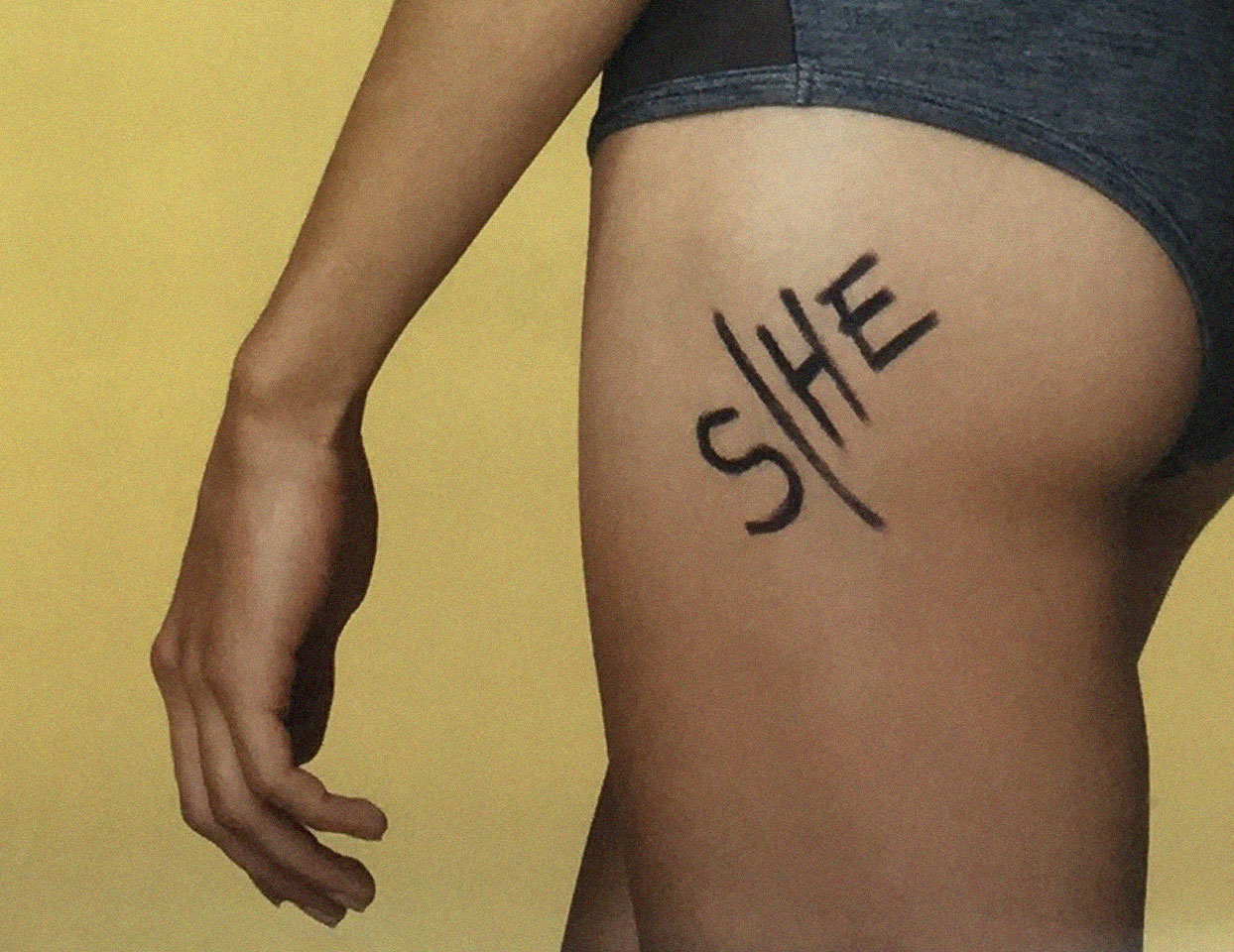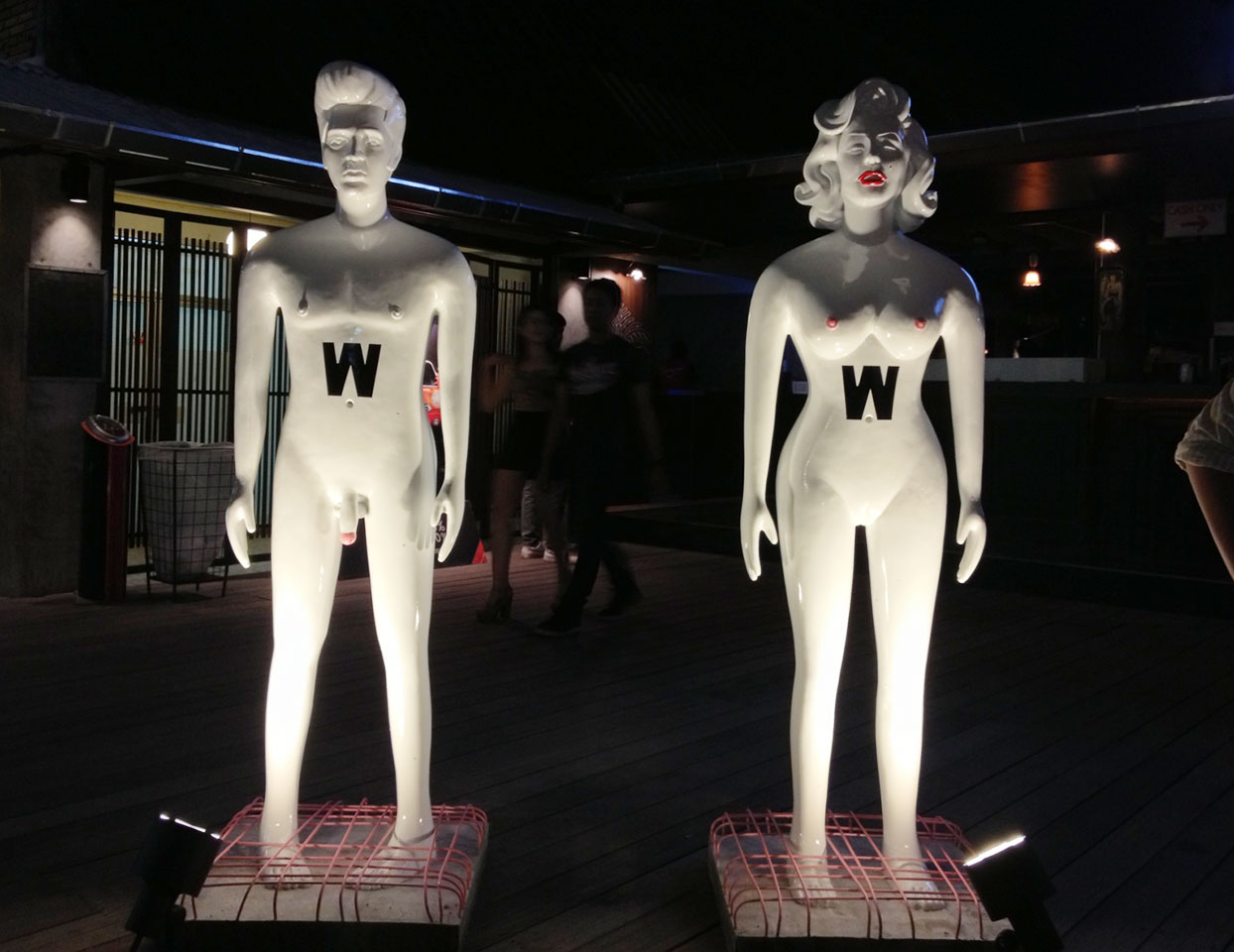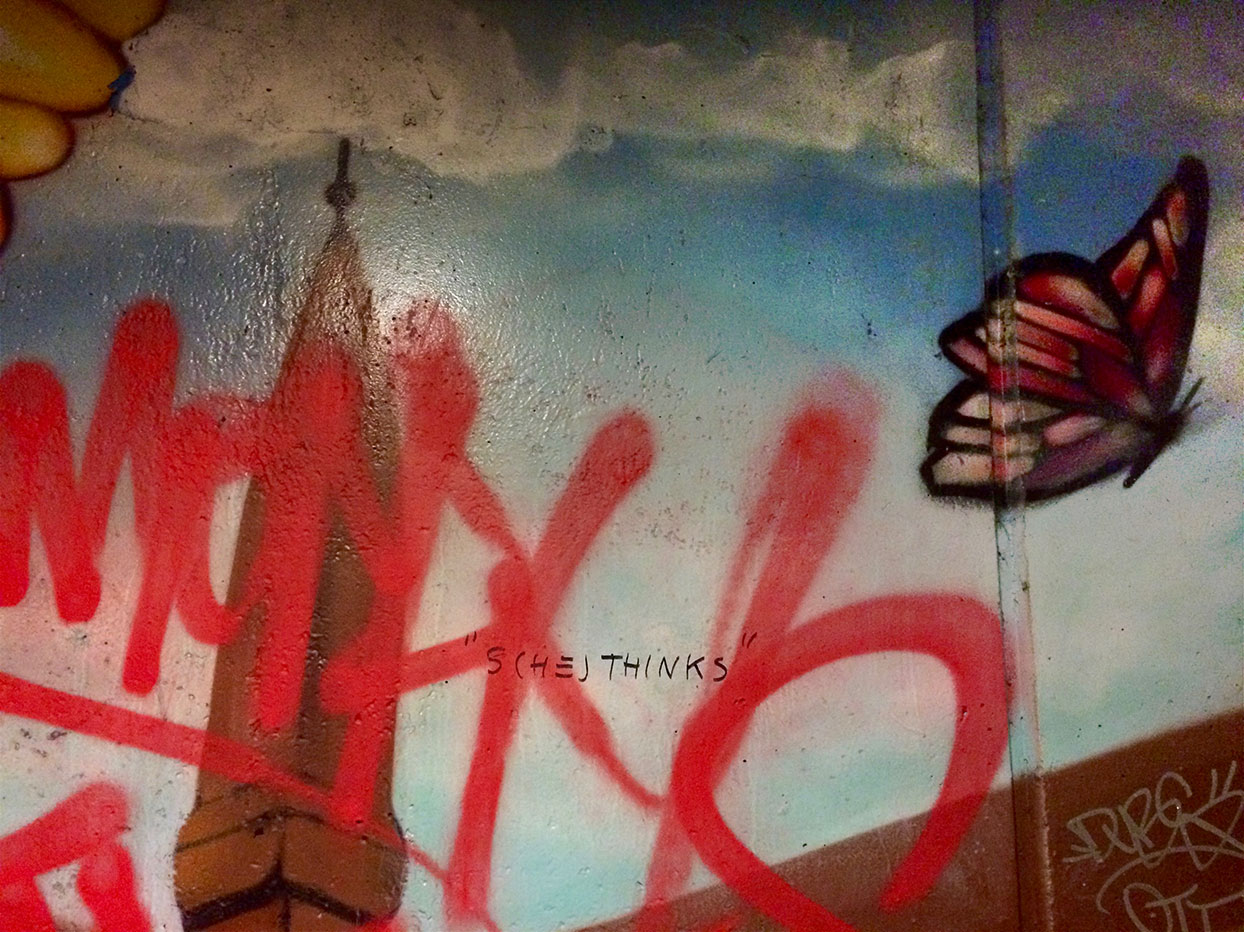On Demasculinization
Speculation on a Demasculinized Society
July 13, 2017essay,
One fateful night the word ‘demasculinization’ came up during a conversation I was having at a bar with my artist-friend André Chapatte. We were discussing the possibility of reconfiguring the male gaze. A few days later we met up again and decided that we should work further on this idea. We started to exchange thoughts, writing and things to read almost immediately. Throughout 2016 we worked together in Amsterdam, Berlin and Brussels. In our correspondence, we discussed (in no particular order) (de)masculinity, nature / culture, manhood, manly emotions, the male gaze / perspective, gender equality, gender neutrality, redefining of men in society, gender in public / private / domestic spaces, romanticism, objectification, violence, power, domesticity, gendered-language / words / tones / expectations, privileges, sex, domination and cultural hegemony.

This speculative essay on demasculinization is a culmination of our (myself and André Chapatte) ongoing discussions and exchanges regarding methods for embodying (de)masculinity – understanding emotions as a strategy to rebel against the larger patriarchal capitalist system. Although the initial intention was to move towards ‘achieving gender equality’, I have since changed course in order to both construct and speculate on what demasculinization could mean and give rise to. My motivation is not just to consider the meaning and process of demasculinization, but also to create a lexicon for this potentially under-theorized idea.
We want to understand how we as men can rethink and reposition ourselves in this patriarchal society and make it less patriarchal by envisioning a different course for Homo sapiens in retrospect. How to stop ‘acting like a man’; here, I find the words of author, educator and activist Tony Porter most fitting:
... how do I want men to be acting and behaving? I need you on board. I need you with me. I need you working with me and me working with you on how we raise our sons and teach them to be men – that it's okay to not be dominating, that it's okay to have feelings and emotions, that it's okay to promote equality, that it's okay to have women who are just friends and that's it, that it's okay to be whole, that my liberation as a man is tied to your liberation as a woman.1
For this essay I have decided to deviate from (not disregard) a direct connection to existing institutionalized discourses within feminist theory, gender studies, race studies and colonial studies in the spirit of 'contingency'. That is, I ask whether it is possible to explore (and fail) freely and independently without any kind of explicit reliance on these fields.
Demasculinization – not even a word as far as my computer is concerned – is currently only used in the medical world and is often described as an action or a process indicating the ‘removal of masculine characters or qualities, the removal of the male testicles or an animal’.2
This definition – or lack thereof – prompted me to inquire deeper into the ‘word’. The suffix ‘‑ization’ signifies an act, a process or result of doing or making. I therefore reason that (de)masculinity must have a cultural and social meaning in order to arrive at demasculinization as a process. That meaning embraces speculation on recalibrating the male disposition and habitus in current male-dominated and patriarchal societies around the world. In so doing, the meaning of manhood is redefined within the context of post-humanist thinking. Humanist theories are often aligned and interwoven with (neo)colonial and imperial discourse and the framework of associated discourses within the Western canon. As such, the world persists in oppressing and misrepresenting others – those who are not white European males – in a perpetual, systemic reproduction and reinvention of colonial vocabulary.3 A core aim of this essay is not to ‘reproduce’ such language that reifies the ‘another subject’ we ought to scrutinize. In The Posthuman, Rosi Braidotti writes on the reality of current hierarchical relationships sustained by Western humanism:
... by organizing differences on a hierarchical scale of decreasing worth, this humanist subject defined himself as much by what he excluded from, as by what he included in, his self-representation, an approach which often justified a violent and belligerent relationship to the sexualized, racialized and naturalized ‘others’ that occupied the slot of devalued difference. Furthermore, claims to universalism were critiqued as being exclusive, androcentric and Eurocentric. They support masculinist, racist or racial supremacist ideologies that turn cultural specificity into a fake universal and normality into a normative injunction. This image of thought perverts the practice of the Humanities and in particular theory into an exercise of hierarchical exclusion and cultural hegemony.4
I can no longer sit idly knowing that such occurrence(s) still exist(s) in countless ways through governing institutions and a larger superstructure that maintains this systemic patriarchal (and racial) hegemony. At the heart of this assembly of short texts is a fantasy-like speculation on a ‘demasculinized’ world that reveals both the preconditions and conditions of emotions, (de)masculinity, power-balance, language, nature and culture.
The Demasculinized Bestiary

Homo sapiens, genus: Homo, familia: Hominidae
Discovered over 200,000 years ago, this sub-species advanced exponentially in the last 20,000 years. Members survived, procreated and progressed theologically, epistemologically, scientifically, and finally, technologically. However, they are highly dependent on material resources and possibly ontologically impaired, only able to think of being in relation to the self as origin. The lack of cosmological and planetary understanding caused them to rely on artificial structures – both physically and metaphysically – unnatural constructions that greatly thwarted their later developments…
Homo Dm sapiens, genus: Homo, familia: Hominidae
Homo Dm sapiens are the first sub-species of Homo sapiens. They are the transformation of a masculinized homo man into a demasculinzed homo wo(man). Although physically a man, her(his) values cannot be differentiated in terms of a specific gender. S(he) is able to take advantage of the earlier Homo sapiens’ advances in affectology knowledge. The sub-species comprise highly fluid beings, not easily categorized or classified within fixed roles in societies and able to overcome the confinements of standard behaviour. S(he) shows an advanced capability to explore her(his) potentiality through the display of feelings as a form of strength. S(he) is therefore, strong yet soft and malleable, both internally and externally.
On Demasculinization
The patriarchal capitalist society before mankind, made up of Homo sapiens, evolved into Homo Dm sapiens as wo(men)kind.
- The testicles of the male animal had been removed surgically to control uncontrollable animalistic reproduction cycles, or to keep your pet domesticated in a spatially limited domicile. The male species of Homo sapiens then devised (il)logical rhetoric against nature and culture.
- The (super)structures of the Homo sapiens’ world were highly chaotic; their reliance on ontological knowledge of truth and fact have permanently impaired their lives and livelihoods. The space of politics began facilitating a deliberate lack of correspondence, which caused them to thrive on miscommunication. Throughout history, language had mostly been employed to describe or classify in order to demarcate specificities, creating an internal and external relation. This obsession with classification created an overload of information, which caused Homo sapiens to be somewhat blinded and unable to see what fell outside the usual classifications.
- Homo sapiens have created, in the last two centuries, more knowledge and information than in any other period of recorded history.5 But through the organization and classification of knowledge, humans have become more and more delusional. But, who are the subconscious ones? Who created the knowledge or provided such information? Could something be accepted as unknown?
- The limit in knowledge production was largely defined and confined to language – visual, written and spoken – as a cognitive and communicative exchange between people. Since language was shaped by outdated patriarchal gender roles, language had to change to adjust to expectations through a new form of language construction, new vocabularies that could in turn create a new future-space of politics, away from the former organized cosmology, before that of Homo Dm sapiens.
- During the seventeenth and eighteenth century, thinkers of the European Enlightenment produced knowledge of the world by scrutinizing the formerly holistic cosmology through a male gaze. The separation into nature and culture led to the extraction of men from nature and allowed for a growing sense of entitlement in exploiting nature. Have we been forging worlds that are problematized by men and only matter to men?
- Perhaps we (mankind) didn’t quite know who we were before, since we have been defining and categorizing ourselves strictly as Homo sapiens. Yet, ironically many ideas or ideals were set forth by using (the body and / or the mind of) men as the central point of argument or departure. The aim would be to decentralize and deterritorialize narcissistic men by interrupting the act of being a man, by not breaking down but allowing for permutations (of the others). However, the altering of this psyche requires gradually developing human consciousness in the neocortex through socialization and proper education, a human-induced evolution.
- The privileges that come along with being a man involved a reduced fear of judgement. However, the price for this was the expectation to be more (and not less) of... the ‘other’. Since these expectations form behavioural norms, where do expectations begin? What kind of responsibilities constitute being a man?

Deumtopia
A demasculinized utopia after the evolution of Homo sapiens into Homo Dm sapiens.
- As the economy became increasingly structured according to collective efficiency (instead of individual fluency), the collective strength over the next century was built upon the transparency of both individual and communal emotions and social responsibility to support and facilitate the evolutionary conversion to Homo dm sapiens. Humans began to present their vulnerability through humble signals, a widely approved step as it allowed others to learn and understand each other better, which in turn spawned collective point value, reflecting the efficiency level of a specific society or group. The humble signal also aided the learning possibilities of the species and greatly improved their skill in understanding what were previously classified as things, ‘objects’ or subjects of study through empathy. These things were also approached with ‘humble signals’ that comprised traits like curiosity, sensitivity and social ambivalence.
- These characteristics have since shifted expectations away from a patriarchal system. Moreover, societies have evolved to a point where social responsibility and etiquette overtakes individual responsibility; the willingness to depend on and be dependent on others is the epitome of a strong, dynamic society and economy. The expectations that come with the responsibilities are interdependent, and do not fall on an individual’s shoulders but constitute the binding force between individuals.
- Due to the binding character of many societies, sociopolitical awareness has grown into a de-a-political space where new languages and vocabularies begin to substantiate.9 Humble signals drastically changed the verbal patterns, making everyday speech, media and knowledge production much kinder but not any less analytical, although at the time ambiguous. The de-a-political space hence, also allows for many smaller informal economies and alternative groups to coexist with the larger non-dominating force.
- Is this a deumtopia?

S(he) Thinks
This period marks the transitional phase of Homo sapiens utilizing different mechanisms, reorganizing spaces and seeking through various means in an attempt to think for the larger cause.
- The Homo sapiens had been ontologically impaired, making all relationships on the same plane extremely difficult. Science and rationality denounced religion and brought about secularization (in Europe), while philosophy became caught up in its entanglements. The lack of correspondence is the space for politics – politics of division, politics of knowledge and politics of material resources. ‘The subject of theological knowledge depended on the dictates of God while the subject of secular philosophy / science depended on Reason, on the Cartesian ego / mind and Kant’s transcendental reason.’6
- If this creature – Homo sapiens – attempted to unman, to demasculinize itself, in the hope of understanding its environment and situation better – for not everything is manly or womanly per se – would that create a more controllable scenario by being less controlled? The Homo sapiens has recently discovered this specific character it never thought it possessed, that allowed it to be fluid in order to move through constructed paradigms – whether by nature or by culture. However, it is a highly unstable and precarious state (of mind). He sought out likeminded fellows around him to uncover this messiness.
- This transition, from a Homo sapiens to a Homo Dm sapiens happened in a space that came to be known as the ‘passage’. In the passage, the Homo sapiens sent out enhanced ‘humble signals’ from deep within the hippocampus of the limbic system to other mates, expressing his stress conditions. It helped him to gradually learn about himself through a state of ambiguity. While in this state, his emotions ran free granting the manly Homo Dm sapiens the ability to express themselves through their emotions. The exhibition of vulnerability allowed for both freedom of movement and stillness between spaces, as well as to de-a-politicize.7 And it was good because Wo(men)8 didn’t have to hide behind these confining structures that used to dictate so much of their lives and livelihoods.

S(he)-ness
S(he) thinks.
Therefore, S(he) does.
S(he) is equal.
1. Tony Porter, ‘A Call to Men’, lecture at TEDWomen, 10 December 2010, www.youtube.com.
2. See www.thefreedictionary.com.
3. ‘Colonial vocabulary’ refers to the systemic language alongside colonial history and coloniality.
4. See Rosi Braidotti, The Posthuman (Cambridge, UK: Polity Press, 2013).
5. See www.techcrunch.com.
6. Walter D. Mignolo, ‘Epistemic Disobedience, Independent Thought and De-Colonial Freedom’, Theory, Culture & Society 26, no. 7–8 (2009): 18.
7. A combination of the words ‘depoliticize’ and ‘apolitical’ as a process of political deduction or deconstruction through and by being apolitical.
8. Wo(men) meaning humans of all genders.
9. ‘De-a-political’, is the merging of two words: ‘apolitical’ and ‘depoliticize’, meaning to make political but not to engage directly in a political manner, unless in a disguise.
Wayne W. J. Lim (born 1989) is an art practitioner who writes, researches and occasionally makes things that revolve around political economy and geopolitics concerning the economics of identity and precariousness caused by economic or state regimes. Due to his research, writing and travelling practice, he is often challenged to transfer local / cultural / social / political codes through a method of speculation and strategic thinking, in the hope of opening up possibilities for imagination or an alternative future. See further: www.waynewjlim.com.